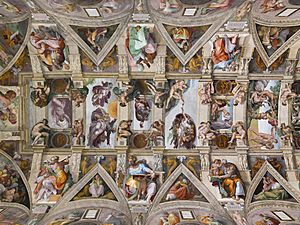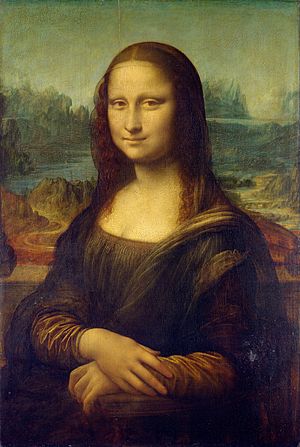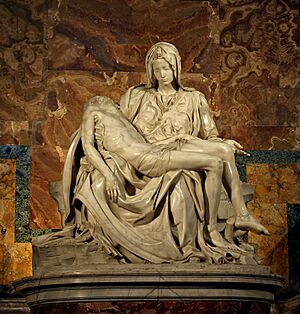Cinquecento facts for kids

Cinquecento (pronounced Chin-kweh-CHEN-toh) is an Italian word that means "five hundred." It's used to describe the 16th century in Italy, especially a time when Italian art, music, writing, and architecture were incredibly famous. During the Cinquecento, Italy was a leader in European culture and creativity.
Contents
What was the Cinquecento?
During the Cinquecento, Rome became the most important center for culture in Italy. The Pope in Rome supported many big art projects. These projects included building St. Peter's Cathedral and the famous Sistine Chapel. This brought many talented artists to Rome, like Michelangelo, Raphael, Cellini, and Bramante.

Michelangelo Buonarroti was one of the most famous artists of this time. He was a painter, sculptor, architect, poet, and engineer. People often called him a "Renaissance man" because he was so talented in many different areas, just like Leonardo da Vinci. Michelangelo created many famous artworks that are still admired today.
Michelangelo's Famous Works
Some of Michelangelo's most well-known sculptures are the Pieta in Saint Peter's Basilica and David. The David statue was once in a public square in Florence but is now in a gallery. His most famous paintings are huge frescos on the Sistine Chapel Ceiling and the Last Judgement. He also designed the dome of Saint Peter's Basilica.
Other Important Artists
Only Venice in Italy could match Rome's artistic achievements, especially in painting. Artists like Bellini, Giorgione, and Tiziano created their masterpieces there during this century.
Leonardo da Vinci spent his last years during the Cinquecento. He painted two of the world's most famous pictures during this time: the Mona Lisa and the Last Supper.
Literature and Architecture
In 1532, a very important book called The Prince was published. It was a political book written by the Italian diplomat and thinker Niccolò Machiavelli. It is considered a masterpiece of Italian literature.
In architecture, the Cinquecento is famous for Andrea Palladio (1508–80). He is known as "the most influential architect of the whole Renaissance." Palladio changed how palaces and churches were designed. He looked at classical temples for ideas, focusing on simple, grand forms.
Palladio often used a special design called the Palladian Arch. This design has a large arched opening with smaller square-topped openings on each side. It was inspired by ancient Roman structures like the Arch of Constantine.
Historical Changes
The Cinquecento was also a time of big historical changes for Italy. The country faced invasions from France, and Rome was attacked in 1527 in an event called the "Sack of Rome." Later, Italy was affected by wars mainly between France and the rising power of Spain. Spain had become very rich and powerful after Cristoforo Colombo discovered America. These wars divided the Italian peninsula and its rich Renaissance culture between these two powerful countries.
Related pages
- Burke, Peter. The Italian Renaissance: Culture and Society in Italy. Princeton University Press. Princeton, 1999.
See also
 In Spanish: Cinquecento para niños
In Spanish: Cinquecento para niños


